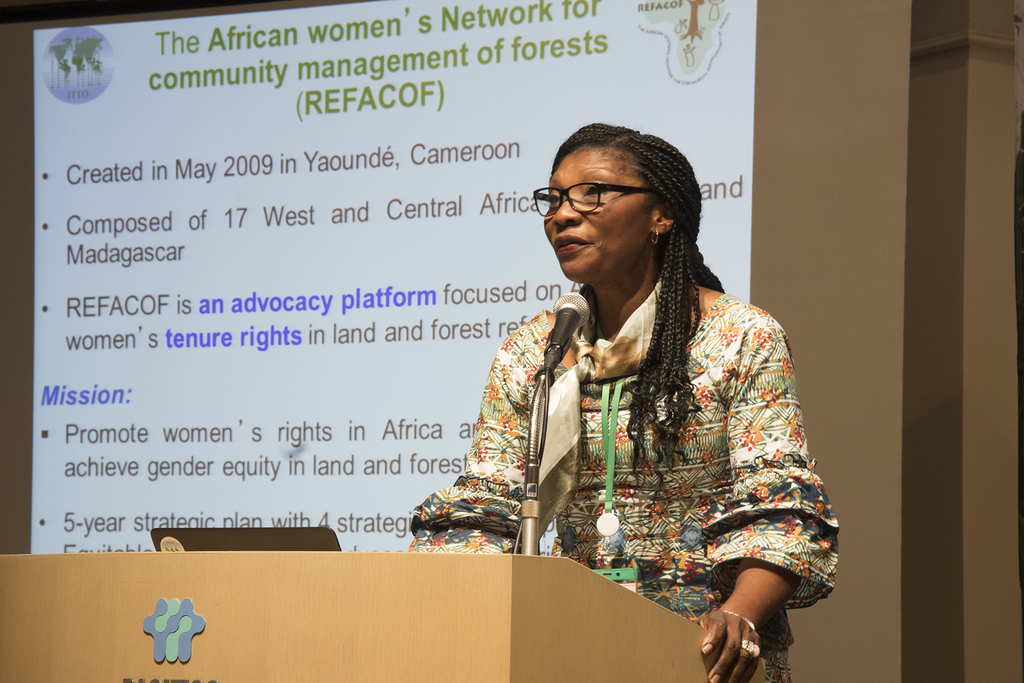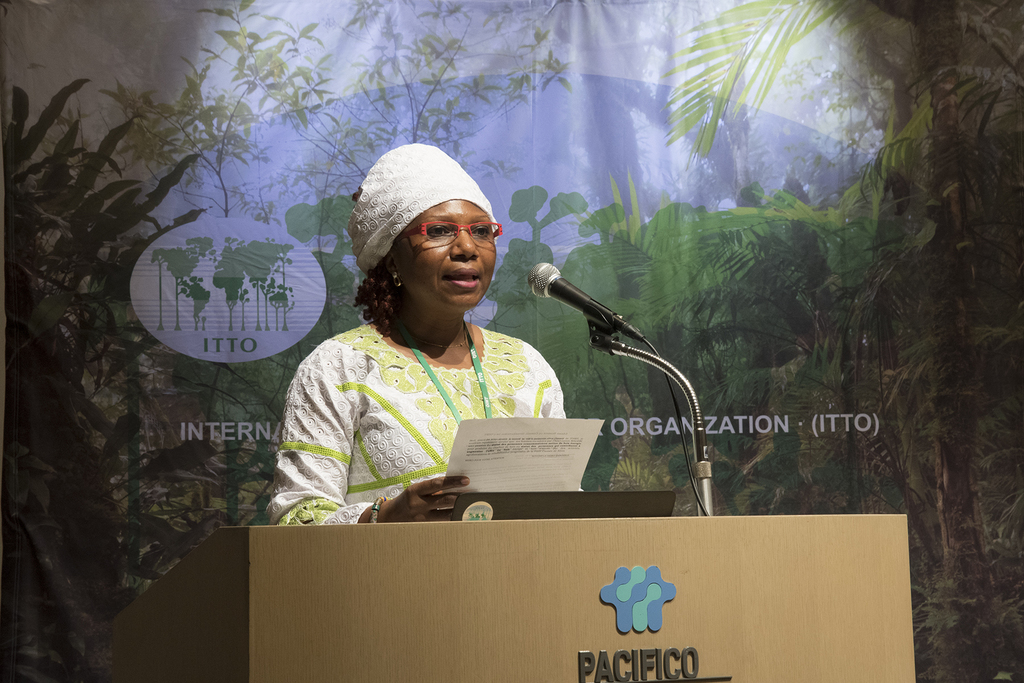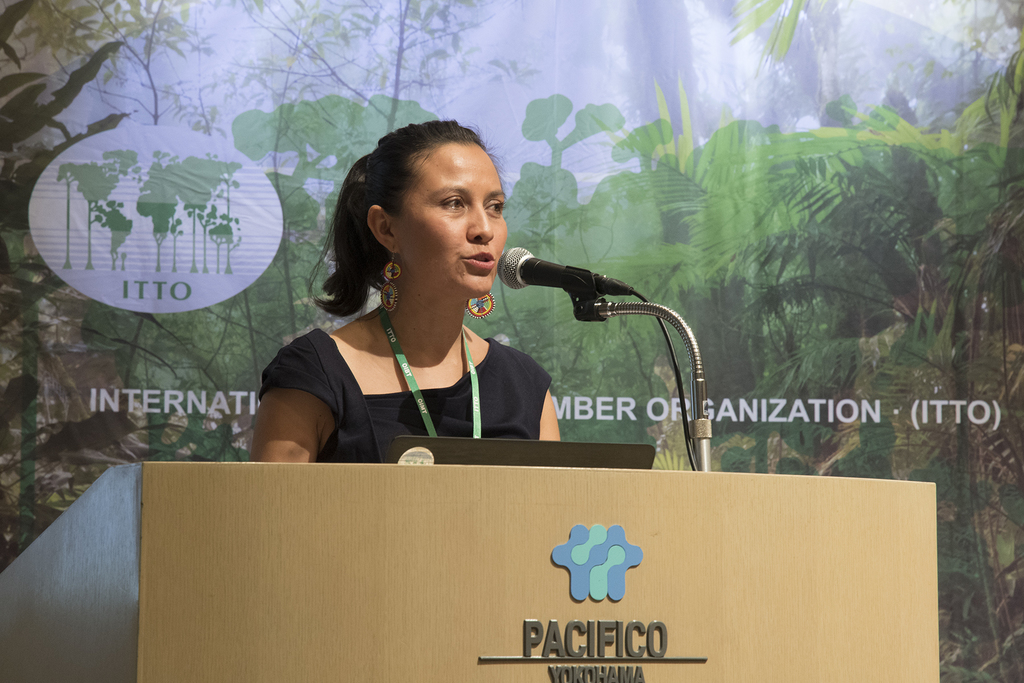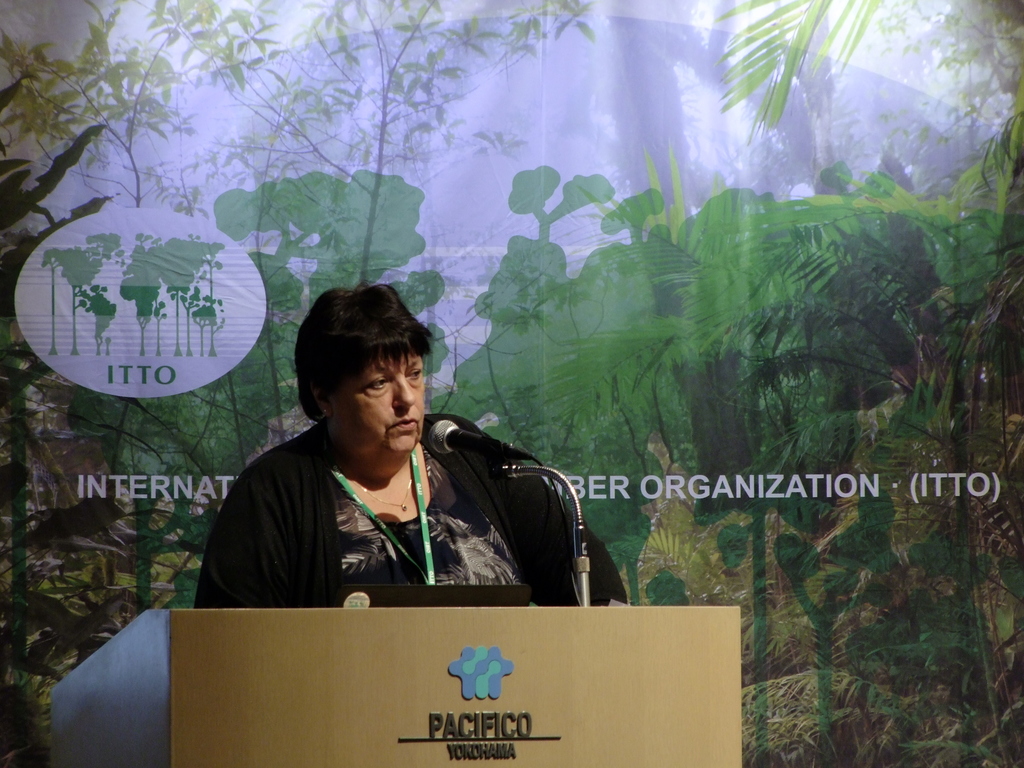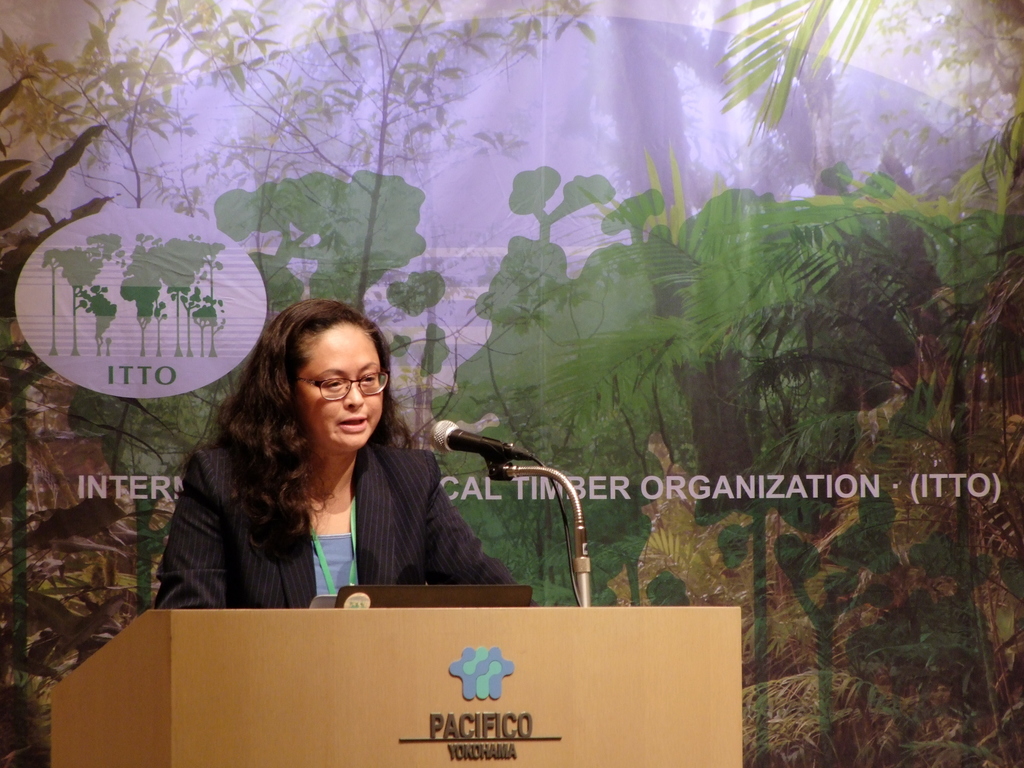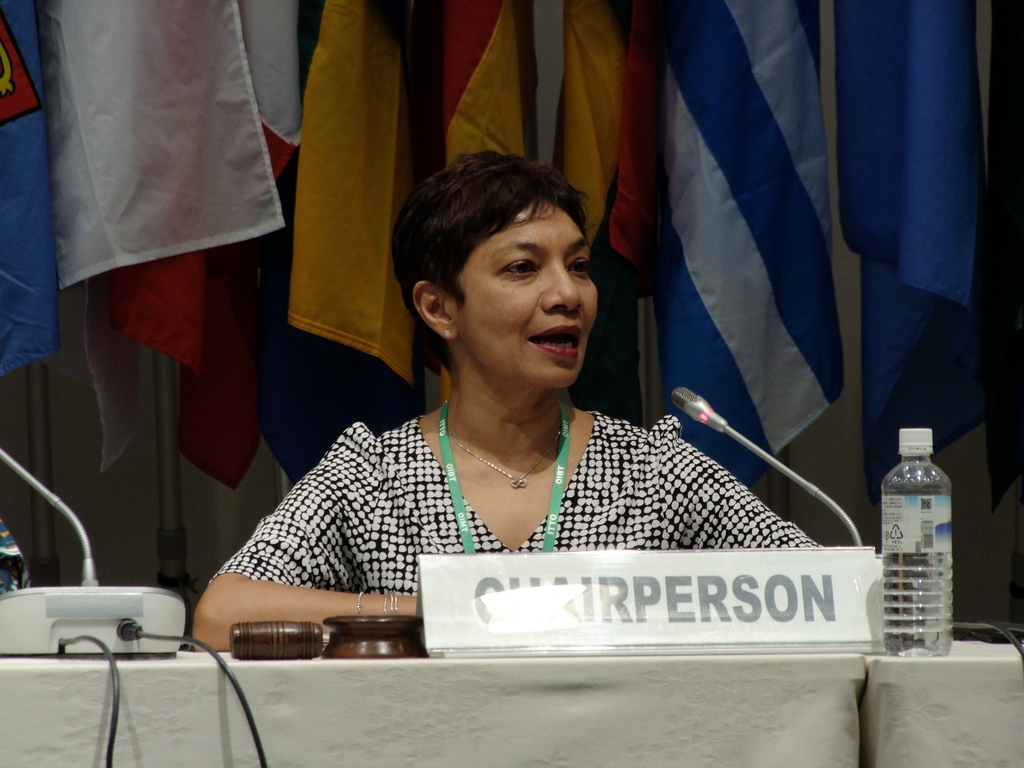Civil-society panel urges stronger role for women in forestry
Panel on the role of women in achieving ITTO’s objectives
Female panelists and staff gather on the podium at the conclusion of the discussion on the role of women in achieving ITTO's objectives. Photo: Y. Kamijo
Women’s role in the management of forests and other natural resources can no longer be forgotten or dismissed, said Rosalie Matondo, Minister of Forest Economy in the Republic of the Congo, in a video presented at a panel discussion on women, forestry and ITTO that took place today at the 54th session of International Tropical Timber Council.
“We must not forget that women represent more than half the population of our planet Earth,” said Mme Matondo. “Today, more than ever, we must opt for an inclusive management of natural resources, taking into account all actors, in community forests, around logging concessions or in biodiversity conservation concessions.”
“The principle of the development of these concessions and forest certification are guarantees for … the taking into account of the rural communities and the autochthonous populations in the sharing of the profits related to the exploitation of the forest resources and, at this moment, women can no longer be forgotten or dismissed,” she said.
Another member of the panel, Cécile Bibiane Njebet, President of the African Women’s Network for Community Management of Forests, said women are at the bottom of a hierarchical pyramid in forestry—they are overrepresented as small-scale forest management operators but hugely underrepresented as supervisors, coordinators and owners.
“Women have very limited access and control over forest resources, land, technology, financial resources, training, and information. They also lack awareness of their rights,” said Ms Njebet. “This needs to change.”
Among other things, Ms Njebet recommended that Council members encourage their government agencies to use ITTO’s recently adopted Policy Guidelines on Gender Equality and Empowering Women to link forestry and gender equality with Sustainable Development Goal 5 on gender equality and with other United Nations mechanisms on women’s empowerment.
Delphine Ahoussi, president of MALEBI, a women’s group in Côte d’Ivoire, described how an ITTO project in communities living near the Ahua gazetted forest had enabled women to restore degraded forest land through agroforestry, thereby increasing forest cover; improving food security; and reducing poverty among the local communities. Council members watched a recently produced video of the project.
Adi Estela Lazos Ruiz talked about a process in the Mexican municipality of Jamapa, Mexico, assisted by an ITTO project, to increase women’s participation in the formal forest sector.
“Knowing the importance of forest ecosystem services and of the active participation of the population to maintain them is essential, but it is not enough in the long run,” she said.
“Women and men need empowerment to propel themselves to action. Women are usually the heart of the families, keeping the family together and educating the children, so working with women is a way to community transformation.”
Francois van der Ven described her pathway into forestry, first in Belgium and then Africa.
“When you’re a woman in the timber trade, you have to know your business inside and out,” she said. She is now head of the Industrial Forestry Trade Union in Gabon.
Finally, Jennifer Conje from the US Forest Service said gender issues in forestry were not specific to tropical developing countries but existed in developed countries as well. She described the current US Forest Service initiative, “Stand Up For Each Other”, which is aimed at reminding everyone of their responsibility to protect one another from bullying, harassment and retaliation of any kind.
Ms Conje also shared personal experiences of the challenges and opportunities of being a female working in the forestry world.
The ITTO Secretariat’s Sheam Satkuru, who moderated the panel discussion, said the presentations showed what could be achieved when women were empowered in their communities and in the forest sector. There was a strong commitment in the Organization, she said, to fully implement its Policy Guidelines on Gender Equality and Empowering Women in all the Organization’s work, with the many benefits this will bring.
Presentations from the panel are available here.
The International Tropical Timber Council meets at least once a year to discuss a wide-ranging agenda aimed at promoting sustainable tropical forest management and the trade of sustainably produced tropical timber.
Daily coverage of the session by the Earth Negotiations Bulletin is available at http://enb.iisd.org/forestry/itto/ittc54/
Women’s role in the management of forests and other natural resources can no longer be forgotten or dismissed, said Rosalie Matondo, Minister of Forest Economy in the Republic of the Congo, in a video presented at a panel discussion on women, forestry and ITTO that took place today at the 54th session of International Tropical Timber Council.
“We must not forget that women represent more than half the population of our planet Earth,” said Mme Matondo. “Today, more than ever, we must opt for an inclusive management of natural resources, taking into account all actors, in community forests, around logging concessions or in biodiversity conservation concessions.”
“The principle of the development of these concessions and forest certification are guarantees for … the taking into account of the rural communities and the autochthonous populations in the sharing of the profits related to the exploitation of the forest resources and, at this moment, women can no longer be forgotten or dismissed,” she said.
Another member of the panel, Cécile Bibiane Njebet, President of the African Women’s Network for Community Management of Forests, said women are at the bottom of a hierarchical pyramid in forestry—they are overrepresented as small-scale forest management operators but hugely underrepresented as supervisors, coordinators and owners.
“Women have very limited access and control over forest resources, land, technology, financial resources, training, and information. They also lack awareness of their rights,” said Ms Njebet. “This needs to change.”
Among other things, Ms Njebet recommended that Council members encourage their government agencies to use ITTO’s recently adopted Policy Guidelines on Gender Equality and Empowering Women to link forestry and gender equality with Sustainable Development Goal 5 on gender equality and with other United Nations mechanisms on women’s empowerment.
Delphine Ahoussi, president of MALEBI, a women’s group in Côte d’Ivoire, described how an ITTO project in communities living near the Ahua gazetted forest had enabled women to restore degraded forest land through agroforestry, thereby increasing forest cover; improving food security; and reducing poverty among the local communities. Council members watched a recently produced video of the project.
Adi Estela Lazos Ruiz talked about a process in the Mexican municipality of Jamapa, Mexico, assisted by an ITTO project, to increase women’s participation in the formal forest sector.
“Knowing the importance of forest ecosystem services and of the active participation of the population to maintain them is essential, but it is not enough in the long run,” she said.
“Women and men need empowerment to propel themselves to action. Women are usually the heart of the families, keeping the family together and educating the children, so working with women is a way to community transformation.”
Francois van der Ven described her pathway into forestry, first in Belgium and then Africa.
“When you’re a woman in the timber trade, you have to know your business inside and out,” she said. She is now head of the Industrial Forestry Trade Union in Gabon.
Finally, Jennifer Conje from the US Forest Service said gender issues in forestry were not specific to tropical developing countries but existed in developed countries as well. She described the current US Forest Service initiative, “Stand Up For Each Other”, which is aimed at reminding everyone of their responsibility to protect one another from bullying, harassment and retaliation of any kind.
Ms Conje also shared personal experiences of the challenges and opportunities of being a female working in the forestry world.
The ITTO Secretariat’s Sheam Satkuru, who moderated the panel discussion, said the presentations showed what could be achieved when women were empowered in their communities and in the forest sector. There was a strong commitment in the Organization, she said, to fully implement its Policy Guidelines on Gender Equality and Empowering Women in all the Organization’s work, with the many benefits this will bring.
Presentations from the panel are available here.
The International Tropical Timber Council meets at least once a year to discuss a wide-ranging agenda aimed at promoting sustainable tropical forest management and the trade of sustainably produced tropical timber.
Daily coverage of the session by the Earth Negotiations Bulletin is available at http://enb.iisd.org/forestry/itto/ittc54/
Mme Rosalie Matondo, Minister of Forest Economy of the Republic of the Congo address to the panel on the role of women in achieving ITTO's objectives
Watch the video on how ITTO helped women create thriving charcoal business
Interview with Adi Lazos on ITTO's Fellowship Programme and the role of women in forestry
Cécile Bibiane Njebet, President of the African Women’s Network for Community Management of Forests, said women are at the bottom of a hierarchical pyramid in forestry. Photo: K. Sato/ITTO
Delphine Ahoussi, president of MALEBI, a women’s group in Côte d’Ivoire, described how an ITTO project in communities living near the Ahua gazetted forest had enabled women to restore degraded forest land. Photo: K. Sato/ITTO
Adi Estela Lazos Ruiz talked about a process in the Mexican municipality of Jamapa, Mexico, assisted by an ITTO project, to increase women’s participation in the formal forest sector. Photo: K. Sato/ITTO
Francois van der Ven described her pathway into forestry, first in Belgium and then Africa. Photo: Y. Kamijo
Jennifer Conje from the US Forest Service said gender issues in forestry were not specific to tropical developing countries but existed in developed countries as well. Photo: Y. Kamijo

